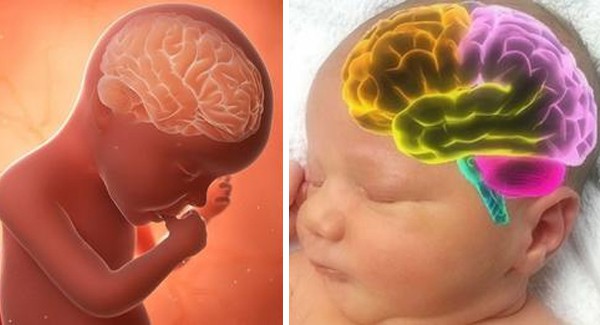Raising an intelligent child is every parent’s dream. Mumma’s joy has no bounds when the little Einstein utters his first set of words. And then begins the preparation to make sure that every curious action of the baby is responded to. At birth, your baby’s brain contains 100 billion neurons (as many as there are stars in the Milky Way!). During his first years, he will grow trillions of brain-cell connections, called neural synapses. Pretty impressive, right? Raising an intelligent child is every parent’s dream. Mumma’s joy has no bounds when the little Einstein utters his first set of words. And then begins the preparation to make sure that every curious action of the baby is responded to.
There are many factors responsible for brain development in babies, making them more aware and intelligent. Foods are decided based on their ability to boost brain power; toys are selected based on mind enhancing mechanisms, exercise, exposure, every journey seeks just one destination – an intelligent child. So, here’s the good news. There are ways to make sure that your little wonder turns out to be a genius. And here are a few working ways to boost your baby’s intelligence levels.
- Healthy Food Habits:

Introducing brain foods to your baby’s diet is an important step to enhance their brain power. Fruits, greens, dairy products, dry fruits, eggs, nuts, and seeds are a few to name. Whipping nutritious foods in interesting combinations will ensure that both brain cells and taste buds are equally satiated.
- Don’t Interrupt Your Baby’s Sleep:

A study suggests that one less hour of sleep every night could cut down two cognitive years in a child. A baby’s brain develops rapidly during the active sleep phase. It’s during these snooze hours that the key neuronal connections are made, and links between left and right hemispheres of the brain are strengthened. Babies that get the required amount of sleep develop better language, attention and impulse control.
- Breastfeeding:

Mother’s milk is like a magic potion to boost a baby’s brain power. Breastfeeding your baby till the age of one can increase your infant’s overall health and intelligence quotient. Mother’s milk is packed with all the necessary nutrients beneficial for a baby’s complete growth. A healthy baby is closest to being an intelligent baby.
- Exposing Them To Nature:
Research in Spain finds that quality time spent amidst nature, where kids are exposed to trees and allowed to play on green grass, helps in the blossoming of mental abilities. No wonder, babies are always happy when you take them for a walk in the park. The green surroundings relax the babies and increase brain function.
- Make Sure Their Activity Levels Are High:
Research suggests that there is a strong connection between the development of the brain and physical activities in babies. Parents should make sure that their baby gets at least one hour of unstructured physical activity. Higher activity levels increase blood flow to the brain and other parts of the body, thereby resulting in better memory and learning aptitudes. Spend time playing with your baby and rest assured you are playing your part well.
- Choose The Right Music For Your Baby:

Exposing babies to soothing tunes is beneficial for their brain development, thereby boosting cognitive skills. Research suggests that holding your baby close and slow dancing to calming music releases a ‘bonding’ hormone called oxytocin. This same hormone is released while breastfeeding too. Babies who are regularly listening to good music have better memory and are less anxious as adults.
- Reading Bed-Time Stories To Your Baby:
Reading bedtime stories and singing lullabies to your baby has a great track record since ages. It not just develops the bonding between parents and babies but also wires the child’s brain to quickening their ability to make sense of new things. Studies suggest a clear indication of neurological differences between kids who are read to and the ones that haven’t been read to.
- Talk To Your Baby:

Surveys have revealed that talking to your baby enhances their vocabulary and language processing skills as early as 18 months old. Chatting with babies helps them grasp the lip movements, sounds, and pronunciations of a language. Repetition of words enhances their memory and makes it easier for them to associate objects with words. So, don’t give up conversing with your little blabberer thinking that you are not making any sense. They are learning it all from you.


